- Social Factors Help Explain Worse Cardiovascular Health among Adults in Rural Vs. Urban Communities
- Reducing Barriers to Participation in Population-Based Total Cost of Care (PB-TCOC) Models and Supporting Primary and Specialty Care Transformation: Request for Input
- Secretary Kennedy Renews Public Health Emergency Declaration to Address National Opioid Crisis
- Secretary Kennedy Renews Public Health Emergency Declaration to Address National Opioid Crisis
- 2025 Marketplace Integrity and Affordability Proposed Rule
- Rural America Faces Growing Shortage of Eye Surgeons
- NRHA Continues Partnership to Advance Rural Oral Health
- Comments Requested on Mobile Crisis Team Services: An Implementation Toolkit Draft
- Q&A: What Are the Challenges and Opportunities of Small-Town Philanthropy?
- HRSA Administrator Carole Johnson, Joined by Co-Chair of the Congressional Black Maternal Health Caucus Congresswoman Lauren Underwood, Announces New Funding, Policy Action, and Report to Mark Landmark Year of HRSA's Enhancing Maternal Health Initiative
- Biden-Harris Administration Announces $60 Million Investment for Adding Early Morning, Night, and Weekend Hours at Community Health Centers
- Volunteer Opportunity for HUD's Office of Housing Counseling Tribe and TDHE Certification Exam
- Who Needs Dry January More: Rural or Urban Drinkers?
- Rural Families Have 'Critical' Need for More Hospice, Respite Care
- States Help Child Care Centers Expand in Bid To Create More Slots, Lower Prices
SUN Smiles Program Receives Rural Health Program of the Year Award
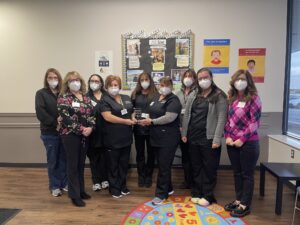 Family Health Council of Central Pennsylvania (FHCCP) and the organization’s Women, Infant, and Children (WIC) Tapestry of Health SUN Smiles program received the Rural Health Program of the Year award, presented by the Pennsylvania Office of Rural Health (PORH). The award was presented by Lisa Davis, director and outreach associate professor of health policy and administration at Penn State, on Nov. 17 at a ceremony at the WIC Tapestry of Health clinic in Shamokin Dam, PA.
Family Health Council of Central Pennsylvania (FHCCP) and the organization’s Women, Infant, and Children (WIC) Tapestry of Health SUN Smiles program received the Rural Health Program of the Year award, presented by the Pennsylvania Office of Rural Health (PORH). The award was presented by Lisa Davis, director and outreach associate professor of health policy and administration at Penn State, on Nov. 17 at a ceremony at the WIC Tapestry of Health clinic in Shamokin Dam, PA.
The Rural Health Program of the Year Award recognizes an exemplary health program that addresses an identified need in a rural community utilizing unique, creative, and innovative approaches to do so.
The award was presented during 2022 Rural Health Week in Pennsylvania, Nov. 14-18. The week encompasses Nov. 17, which is National Rural Health Day, established in 2011 by the National Organization of the State Offices of Rural Health. Both events celebrate “The Power of Rural” by honoring rural American residents, health care providers, and communities.
The nomination, submitted by Karen McCraw, vice president of advocacy and development at Family Health Council of Central Pennsylvania (FHCCP) in Camp Hill, PA, lauded SUN Smiles for developing a comprehensive program that formed partnerships between FHCCP, Central Susquehanna Opportunities, Snyder-Union Community Action Agency, and the Susquehanna River Valley Dental Health Clinic. The program was created to improve oral health outcomes for economically marginalized clients of the Special Supplemental Nutrition Program for WIC clients in Snyder, Union, and Northumberland counties.
The goals of SUN Smiles are to reduce the proportion of adults and children with untreated tooth decay; increase the proportion of children, adolescents, and adults who use the oral health care system; increase the proportion of people with dental insurance; and reduce the proportion of persons who are unable to obtain or delay obtaining necessary dental care. The program also aims to reduce the proportion of children ages one to five who report dental problems, reduce oral health disparities among low-income rural clients, and give every adult and child in WIC the chance to have a healthy smile. All pregnant and postpartum women and children who are clients of WIC are routinely screened for dental needs and referred to Community Health Workers (CHW), as needed, for assistance with Medicaid enrollment, appointment scheduling, transportation, payment for services, and more.
In the first 11 months of the program, SUN Smiles screened 2,028 WIC clients and referred 700 clients to CHWs and 400 clients to dental care; 154 program clients received dental services at FHCCP’s partner dental provider site. In addition to care navigation, oral health education and fluoride varnish days at WIC offices are key elements of the program.
PORH was formed in 1991 as a joint partnership between the federal government, the Commonwealth of Pennsylvania, and Penn State. The office is one of 50 state offices of rural health in the nation and is charged with being a source of coordination, technical assistance, networking, and partnership development.
PORH provides expertise in the areas of rural health, population health, quality improvement, oral health, and agricultural health and safety. PORH is administratively located in the Department of Health Policy and Administration in the College of Health and Human Development at Penn State University Park.
Each year, PORH presents awards to recognize rural health programs and individuals who have made substantial contributions to rural health in Pennsylvania. To learn more about the Pennsylvania Office of Rural Health, visit porh.psu.edu.
East Lycoming Ambulance Association Receives Rural Health Program of the Year Award
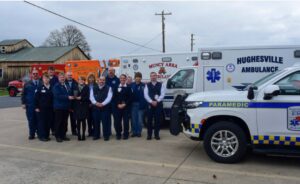 The East Lycoming Ambulance Association (ELAA), Hughesville, PA, received the Rural Health Program of the Year award, presented by the Pennsylvania Office of Rural Health (PORH). The award was presented by Lisa Davis, director of PORH and outreach associate professor of health policy and administration at Penn State, on Nov. 17 at the ELAA headquarters in Hughesville.
The East Lycoming Ambulance Association (ELAA), Hughesville, PA, received the Rural Health Program of the Year award, presented by the Pennsylvania Office of Rural Health (PORH). The award was presented by Lisa Davis, director of PORH and outreach associate professor of health policy and administration at Penn State, on Nov. 17 at the ELAA headquarters in Hughesville.
The Rural Health Program of the Year Award recognizes an exemplary health program that addresses an identified need in a rural community by utilizing unique, creative, and innovative approaches to do so.
The award was presented during 2022 Rural Health Week in Pennsylvania, Nov. 14-18. The week encompasses Nov. 17, which is National Rural Health Day, established in 2011 by the National Organization of the State Offices of Rural Health. Both events celebrate “The Power of Rural” by honoring rural American residents, health care providers, and communities.
The nomination, submitted by Joshua Dorman, ambulance captain at the Hughesville Volunteer Fire Department, Hughesville, PA, recognized the 20-year cooperative effort between four volunteer fire departments, Hughesville Volunteer Fire Company, Muncy Area Volunteer Fire Company, Picture Rocks Volunteer Fire Company, and Muncy Township Volunteer Fire Company. The association is completely self-funded by these fire companies which underwrite Emergency Medical Technicians (EMT) wages and provide the necessary equipment and facility to provide emergency services in rural Pennsylvania.
The fire companies staff a Basic Life Support ambulance seven days a week which is responsible for covering 911 emergency medical calls and vehicle accidents for 10 municipalities in rural Pennsylvania. Throughout the COVID-19 pandemic, this collaboration has been critical for the area due to the significant increase in emergency calls. Without these companies providing these essential services, many of those calls would go unanswered.
PORH was formed in 1991 as a joint partnership between the federal government, the Commonwealth of Pennsylvania, and Penn State. The office is one of 50 s
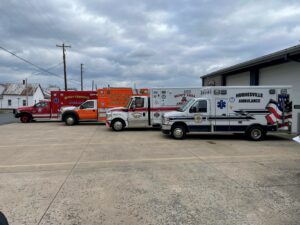
tate offices of rural health in the nation and is charged with being a source of coordination, technical assistance, networking, and partnership development.
PORH provides expertise in the areas of rural health, population health, quality improvement, oral health, and agricultural health and safety. PORH is administratively located in the Department of Health Policy and Administration in the College of Health and Human Development at Penn State University Park.
Each year, PORH presents awards to recognize rural health programs and individuals who have made substantial contributions to rural health in Pennsylvania. To learn more about the Pennsylvania Office of Rural Health, visit porh.psu.edu.
Leader at Wayne Memorial Community Health Centers, Norma Nocilla, Receives Community Rural Health Leader of the Year Award
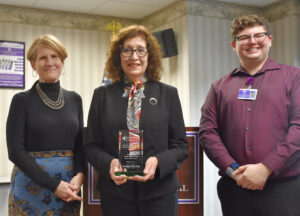 Norma Nocilla, director of clinical operations and quality at Wayne Memorial Community Health Centers (WMCHC), Honesdale, PA, received the 2022 Community Rural Health Leader of the Year Award, presented by the Pennsylvania Office of Rural Health (PORH). The award was presented by Lisa Davis, director of PORH and outreach associate professor of health policy and administration at Penn State during an award ceremony on Nov. 17, 2022, at Wayne Memorial Hospital in Honesdale, PA.
Norma Nocilla, director of clinical operations and quality at Wayne Memorial Community Health Centers (WMCHC), Honesdale, PA, received the 2022 Community Rural Health Leader of the Year Award, presented by the Pennsylvania Office of Rural Health (PORH). The award was presented by Lisa Davis, director of PORH and outreach associate professor of health policy and administration at Penn State during an award ceremony on Nov. 17, 2022, at Wayne Memorial Hospital in Honesdale, PA.
The Community Rural Health Leader of the Year Award recognizes an outstanding leader who organized, led, developed or expanded an exemplary multi-dimensional rural community health program or initiative and who has demonstrated leadership to a rural community health program.
The award was presented during 2022 Rural Health Week in Pennsylvania, Nov. 14-18. The week encompasses Nov. 17, which is National Rural Health Day, established in 2011 by the National Organization of the State Offices of Rural Health. Both events celebrate “The Power of Rural” by honoring rural American residents, health care providers, and communities.
The nomination, submitted by Kyle Davis, outreach and enrollment coordinator at WMCHC, recognized Nocilla for her extensive background in health care leadership, quality, and performance improvement. Nocilla has held various roles that provided her not only with insight into the needs of her community, but state and national issues as well. Nocilla maintained oversight of the clinical integration of four large practice groups across eight sites and 17 providers, earning primary care medical home certification of all sites, which places patients at the center of care and builds meaningful relationships between patients and clinical care teams. She shows concern and recognition for her colleagues and acknowledges the influential role they play in helping WMCHC provide exceptional services to the counties and organizations served by the health center.
Davis stated, “Ms. Nocilla has demonstrated a high level of dedication to bringing high-quality care to our communities. This dedication has been apparent in the achievements outlined above as well as her influence in creating a culture that recognizes and rewards employees for positive patient outcomes while placing an emphasis on learning and designing systems that respond to employees in a fair and just manner.”
PORH was formed in 1991 as a joint partnership between the federal government, the Commonwealth of Pennsylvania, and Penn State. The office is one of 50 state offices of rural health in the nation and is charged with being a source of coordination, technical assistance, networking, and partnership development.
PORH provides expertise in the areas of rural health, population health, quality improvement, oral health, and agricultural health and safety. PORH is administratively located in the Department of Health Policy and Administration in the College of Health and Human Development at Penn State University Park.
Each year, PORH presents awards to recognize rural health programs and individuals who have made substantial contributions to rural health in Pennsylvania. To learn more about the Pennsylvania Office of Rural Health, visit porh.psu.edu.
Agriculture Advocate Denny Hutchison Receives State Rural Health Leader of the Year Award
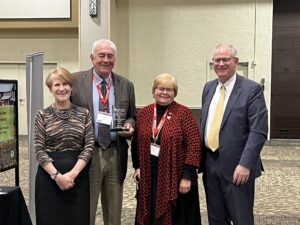
Denny Hutchison, membership chair and past president of the Somerset County Farm Bureau, and member of the Pennsylvania Farm Bureau (PFB) Agricultural Promotion Committee, from Somerset County, PA, received the Rural Health Leader of the Year award, presented by the Pennsylvania Office of Rural Health (PORH). The award was presented by Lisa Davis, director of PORH and outreach associate professor of health policy and administration at Penn State, during a ceremony on Nov. 15, 2022 at the annual PFB meeting, at the Hershey Lodge and Convention Center, Hershey, PA.
The Rural Health Leader of the Year award recognizes an outstanding leader from Pennsylvania for their work and support of rural health initiatives that address an identified need in their district or across the state.
The award was presented during 2022 Rural Health Week in Pennsylvania, Nov. 14-18. The week encompasses Nov. 17, which is National Rural Health Day, established in 2011 by the National Organization of the State Offices of Rural Health. Both events celebrate “The Power of Rural” by honoring rural American residents, health care providers, and communities.
Nominations were submitted by Pennsylvania Secretary of Agriculture Russell Redding; Pastor Nila Cogan of Somerset County; Pennsylvania Rural Development Council Executive Director Mark Critz; James Wyler, from Ambulatory and Community Behavioral Health Network Services at UPMC Western Psychiatric Hospital; and Andrea Brown from UPMC. The nominators recognized Hutchison’s superb community outreach and statewide call for support of mental health needs in local agricultural communities.
Hutchison was lauded for his assistance in developing a crisis line and underwriting training that focuses on learning about the stressors in the agricultural community, recognizing and helping someone in crisis, and developing mechanisms to mitigate the stress. During COVID-19, Hutchison raised awareness in the farming community in Somerset County, discussing rural stress and the mental burden on farmers and their families. He reached out to veterinarians, feed and equipment dealers, and others who interact with farmers to alert them to warning signs of stress and depression. He is currently working with the PFB to raise awareness and make treatment more accessible for Pennsylvania’s farmers.
Hutchison also serves as treasurer, and executive board member of the Somerset County Chamber of Commerce, as a board member of the United Way of Laurel Highlands, and is a member of the Paint Township Planning Committee. He worked for 37 years as a vocational rehabilitation counselor for the Pennsylvania Office of Vocational Rehabilitation. Hutchison is married to his wife, Lori, and enjoys time with his two daughters and two granddaughters.
PORH was formed in 1991 as a joint partnership between the federal government, the Commonwealth of Pennsylvania, and Penn State. The office is one of 50 state offices of rural health in the nation and is charged with being a source of coordination, technical assistance, networking, and partnership development.
PORH provides expertise in the areas of rural health, population health, quality improvement, oral health, and agricultural health and safety. PORH is administratively located in the Department of Health Policy and Administration in the College of Health and Human Development at Penn State University Park.
Each year, PORH presents awards to recognize rural health programs and individuals who have made substantial contributions to rural health in Pennsylvania. To learn more about the Pennsylvania Office of Rural Health, visit porh.psu.edu.
Pennsylvania Senator Elder Vogel, Jr. Receives Rural Health Legislator of the Year Award
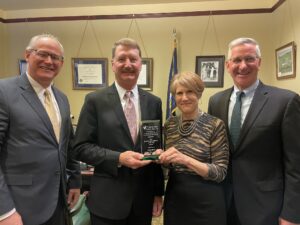
Pennsylvania Senator Elder Vogel, Jr. received the Rural Health Legislator of the Year Award, presented by the Pennsylvania Office of Rural Health (PORH). The award was presented by Lisa Davis, director of PORH and outreach associate professor of health policy and administration at Penn State, during a ceremony on Nov. 15, 2022, at the Main Capitol Building in Harrisburg, PA.
The Rural Health Legislator of the Year Award recognizes an outstanding legislator from Pennsylvania for their work and support of rural health initiatives that address an identified need in their district or across the state.
The award was presented during 2022 Rural Health Week in Pennsylvania, Nov. 14-18. The week encompasses Nov. 17, which is National Rural Health Day, established in 2011 by the National Organization of the State Offices of Rural Health. Both events celebrate “The Power of Rural” by honoring rural American residents, health care providers, and communities.
The nomination, submitted by Pennsylvania Secretary of Agriculture Russell Redding, recognized Vogel for recognizing and addressing the mental health needs of the agricultural community and bringing statewide and community attention to this important issue. As a fourth-generation farmer, Vogel is abundantly aware of the significance of this issue and the missed cries for help. He continues to discuss, share helpful resources, and advocate for the farming community. Vogel also is a compelling advocate of telemedicine for agricultural and rural communities. He sponsored legislation that has defined telemedicine and provided opportunities for rural areas to receive specialized care, including mental health services, without traveling outside the community.
PORH was formed in 1991 as a joint partnership between the federal government, the Commonwealth of Pennsylvania, and Penn State. The office is one of 50 state offices of rural health in the nation and is charged with being a source of coordination, technical assistance, networking, and partnership development.
PORH provides expertise in the areas of rural health, population health, quality improvement, oral health, and agricultural health and safety. PORH is administratively located in the Department of Health Policy and Administration in the College of Health and Human Development at Penn State University Park.
Each year, PORH presents awards to recognize rural health programs and individuals who have made substantial contributions to rural health in Pennsylvania. To learn more about the Pennsylvania Office of Rural Health, visit porh.psu.edu.
Glenn Sterner, Ph.D., of Penn State Abington, Receives Rural Health Hero of the Year Award
 Glenn Sterner, Ph.D., assistant professor criminal justice at Penn State Abington, received the Rural Health Hero of the Year Award, presented by the Pennsylvania Office of Rural Health (PORH). The award was presented by Lisa Davis, director of PORH and outreach associate professor of health policy and administration at Penn State on Nov. 14, 2022 during a ceremony at Penn State Abington in Abington, PA.
Glenn Sterner, Ph.D., assistant professor criminal justice at Penn State Abington, received the Rural Health Hero of the Year Award, presented by the Pennsylvania Office of Rural Health (PORH). The award was presented by Lisa Davis, director of PORH and outreach associate professor of health policy and administration at Penn State on Nov. 14, 2022 during a ceremony at Penn State Abington in Abington, PA.
The award was presented during 2022 Rural Health Week in Pennsylvania, Nov. 14-18. The week encompasses Nov. 17, which is National Rural Health Day, established in 2011 by the National Organization of the State Offices of Rural Health. Both events celebrate “The Power of Rural” by honoring rural American residents, health care providers, and communities.
The Rural Health Hero of the Year award recognizes an outstanding leader who demonstrates a personal and professional commitment to the rural health needs of their community, works with relevant organizations to develop or expand a program that addresses an identified need, and goes above and beyond the call of duty.
The nomination, submitted by Danielle Rhubart, Ph.D. assistant professor of biobehavioral health at Penn State University Park, lauded Sterner for his leadership and coordination between organizations across the state. In addition to being a champion and advocate for rural communities, his work on substance use, human trafficking, and various health conditions have had meaningful impacts on rural residents of Pennsylvania. He uses an innovative approach to address multiple issues, secure funding, and has worked in partnership with state and local law enforcement agencies to deploy resources. Sterner is an influential advocate in multiple areas and consistently demonstrates his recognition of rural health issues across Pennsylvania.
In his current work, he is evaluating the impact of opioid settlement funding in Pennsylvania, with an emphasis on long-term stakeholder engagement for maximizing the impact of opioid settlement funding in Pennsylvania’s communities. He founded the non-profit organization “Regional Interdisciplinary Collaborative Working to Address Human Trafficking.” He also serves on an interdisciplinary team to increase access to prevention programming in rural counties through the Penn State PROmoting School-community-university Partnerships to Enhance Resilience (PROSPER) program, emphasizing connections between prevention and supply reduction initiatives in communities. Sterner developed the Story Powered Initiative to address stigma in communities for conditions that are discriminated against, including substance use, human trafficking, hepatitis C, and HIV/AIDS.
PORH was formed in 1991 as a joint partnership between the federal government, the Commonwealth of Pennsylvania, and Penn State. The office is one of 50 state offices of rural health in the nation and is charged with being a source of coordination, technical assistance, networking, and partnership development.
PORH provides expertise in the areas of rural health, population health, quality improvement, oral health, and agricultural health and safety. PORH is administratively located in the Department of Health Policy and Administration in the College of Health and Human Development at Penn State University Park.
Each year, PORH presents awards to recognize rural health programs and individuals who have made substantial contributions to rural health in Pennsylvania. To learn more about the Pennsylvania Office of Rural Health, visit porh.psu.edu.
Amanda Vaglia, D.O. Recognized as 2022 Rural Health Community Star
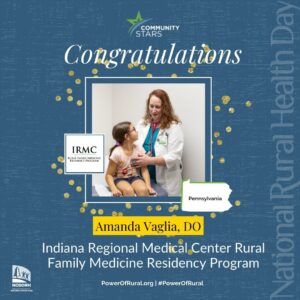
Amanda Vaglia, D.O, Primary Care Physician and Program Director at Indiana Regional Medical Center’s Rural Family Medicine Residency Program, Indiana Regional Medical Center, Indiana. PA, is Pennsylvania’s 2022 Community Star, designate by the National Organization of State Offices of Rural Health (NOSORH). NOSPRH, the member association for each of the 50 State Offices of Rural Health, leads National Rural Health Day. The Pennsylvania Office or Rural Health, University Park, PA, collaborates with NOSORH to recognize those who serve the vital needs of the estimated 57 million people living in rural America.
The nomination, submitted by Lisa Davis, MHA, Director and Outreach Associate Professor of Health Policy and Administration, Pennsylvania Office of Rural Health, University Park, PA, lauded Vaglia’s advocacy for developing the Rural Physician Residency Program at Indiana Regional Medical Center (IRMC), to ensure access to high quality health care and to training the next cohort of talented rural primary physicians. Davis notes, “Dr. Vaglia has deep roots in rural Pennsylvania and has spent her academic and professional career on providing high quality primary care to generations of families, from birth to geriatrics.”
Dr. Vaglia has been a true rural health community champion and star. She has recognized the need to recruit and retain physicians in her community, cultivate rural leadership and practice in medical residents, and address rural population health. Dr. Vaglia is focused on education, collaboration, and communication that led the efforts to fulfill the vision of establishing a family medicine residency program at IRMC, which serves as the rural sole community hospital in the county. The Rural Residency Program has at its core, the mission of providing excellent, comprehensive, family medicine training so that graduates might fill health care disparities in rural Pennsylvania communities.
Dr. Vaglia also serves on statewide Pennsylvania Rural Physician Pathway Planning Committee, a collaboration between the Area Health Education Center program, rural clinical training programs across the state, the Pennsylvania Primary Care Career Center, the Pennsylvania Academy of Family Physicians, and the Pennsylvania Office of Rural Health, to envision an innovative clinical pipeline for recruitment, training, and retention in rural communities.
The National Organization of State Offices of Rural Health’s (NOSORH) annual Community Star recognition program is one of the most popular features of National Rural Health Day. Each person, coalition, and organization nominated to be their state’s Community Star represents the faces and grassroots initiatives that are working to address the social determinants of health and improve the lives of those who call rural their home. The 2022 Community Stars book can be accessed at www.powerofrural.org.
Gov. Tom Wolf Proclaims November 14-18, 2022 Rural Health Week in Pennsylvania
In an effort to draw attention to the wide range of issues that impact rural health, Gov. Tom Wolf has declared Nov. 14-18, 2022, as Rural Health in Pennsylvania week at the request of the Pennsylvania Rural Health Association (PRHA) and the Pennsylvania Office of Rural Health (PORH).
Gov. Wolf made the proclamation to promote awareness of the full range of issues that impact rural health care throughout the Commonwealth and the health status of rural Pennsylvanians. Nationally, Pennsylvania ranks as one of the states with the highest number of rural residents, with 26 percent of Pennsylvanians residing in rural areas. In recognition of Pennsylvania’s diverse rural needs, the Commonwealth has supported the development of the Center for Rural Pennsylvania, the Pennsylvania Office of Rural Health, and other agencies and initiatives to address the needs of rural Pennsylvanians.
The week encompasses Nov. 17, which is National Rural Health Day, established in 2011 by the National Organization of State Offices of Rural Health (NOSORH) to showcase rural America; increase awareness of rural health issues; and promote the efforts of NOSORH, State Offices of Rural Health (SORHs) and others in addressing those issues.
“Nearly 59.5 million Americans, including 3.4 million Pennsylvanians, live in rural communities,” said Lisa Davis, PORH director and outreach associate professor of health policy and administration at Penn State. “These small towns and communities continue to be fueled by the creative energy of citizens who step forward to provide a wealth of products, resources, and services.
Rural communities also face unique health care concerns: a lack of providers; accessibility issues, particularly in terms of transportation and technology; and affordability issues as the result of larger percentages of uninsured and underinsured citizens and greater out-of-pocket health costs. Rural hospitals and health care providers, which frequently are the economic backbone of the communities they serve, deserve special consideration so that they can continue to provide high-quality services and meet the needs of rural residents.”
To celebrate the work being done to achieve health care access and equity in Pennsylvania, PORH will present Pennsylvania Rural Health Awards during in communities across Pennsylvania.
PORH was established in 1991 to enhance the health status of rural Pennsylvanians and strengthen the delivery and quality of care in the communities in which they live. Each year, the organization presents awards to recognize rural health programs and individuals who have made substantial contributions to rural health in Pennsylvania. To learn more about the Pennsylvania Office of Rural Health, visit porh.psu.edu.
PRHA is dedicated to enhancing the health and well-being of Pennsylvania’s rural citizens and communities. Through the combined efforts of individuals, organizations, professionals, and community leaders, the Association is a collective voice for rural health issues and a conduit for information and resources. More information can be found at paruralhealth.org.
National Strategy to Address Mental Health Crisis

Three strategy directives announced by the White House include: 1) Strengthen system capacity to expand the supply, diversity, and cultural competency of the mental health workforce, particularly in rural and underserved areas. This effort will include training and opportunities for paraprofessionals such as community health workers and peer recovery coaches. 2) Connect patients to care by expanding and strengthening access to mental health and recovery services. The President’s budget for fiscal year 2023 will propose that all health plans cover robust behavioral health services with an adequate network of providers, including three behavioral health visits each year without cost-sharing. 3) Create healthy environments by addressing social determinants of health. This will involve adjustment to standards and practices for online marketing and social media, expansion of early childhood and school-based intervention services, and mental health resources for incarcerated individuals. According to the 2020 results from the National Survey on Drug Use and Health, approximately 7.7 million nonmetropolitan adults reported having any mental illness, accounting for 20.5 percent of nonmetropolitan adults. At HRSA, our work to implement this strategy means taking action.
Just the “FAQs”: Your Risk Management Questions, Answered
Join ECRI on March 1 or 2 for a FREE live webinar from the Clinical Risk Management Program on behalf of HRSA. ECRI staff will address health centers’ most frequently asked questions (FAQs) on how to get started on developing a risk management training plan, how to choose topics for training, how to manage procedural aspects of risk management and other specialty training, and more. Relevant resources will be provided, and strategies for getting started on challenging projects will be shared. Click on the desired date and time below to register.
